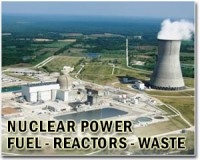 |
Berlin (UPI) Apr 19, 2011 Most European nations lack safety standards that would protect nuclear power plants from terrorist attacks involving aircraft, the head of Germany's reactor security commission said Tuesday. "A majority of countries have very low safety requirements for the scenario of a plane crashing into a reactor," Rudolf Wieland told the foreign press corps in Berlin. Wieland heads an independent reactor security commission that was appointed by German Chancellor Angela Merkel to check all 17 nuclear reactors in Germany for their safety. There have been reports that some of Germany's seven oldest reactors -- built during the 1970s -- wouldn't withstand a direct hit from a large passenger plane. Merkel last month decided to shut all seven down for the duration of the moratorium and possibly for good. The commission is conducting stress tests that simulate impacts with planes of different sizes. It's also running tests for natural events such as major floods, storms and earthquakes. The scope of these virtual disasters is much larger than in previous tests in a bid to account for the nuclear crisis caused by Japan's March 11 earthquake and tsunami, Wieland said. While previous simulations examined the effects of two-hour power outages, the new ones will take into account three days without electricity, for example. Wieland said he didn't want to reveal how the German reactors had performed in the stress tests so far but noted that safety standards in Germany "have always been very high." German Environment Minister Norbert Roettgen had previously said the German tests were among the toughest worldwide, urging the European Union and Group of 20 members to adopt similar standards. The German stress tests, however, take place mostly on paper, with expert teams visiting nuclear power plants only in cases in which new data have to be gathered. "There's simply not enough time to conduct a completely new analysis," Wieland admitted. "But we will identify where we need further tests." Critics have denied that Germany is protected from a Japan-style disaster, especially when it comes to post-fall out strategies. German news magazine Der Spiegel on Monday published an article that criticized German nuclear emergency response plans as ineffective and at times non-existent. Evacuating tens of thousands of people, the report concluded, would likely result in a humanitarian catastrophe. Wieland rejected reports that the German catastrophe response was ineffective, saying that catastrophe response training was conducted regularly at the regional and local level. "These exercises have shown that we're well prepared," he said. He added, however, that the reactor operators, which include utilities Eon, RWE, Vattenfall Europe and EnBW, could do more to improve emergency precautions at the reactors, for example by placing fire extinguishers in buildings that can't collapse. The commission will unveil its test results May 15, a month before a three-month nuclear moratorium called for by Merkel runs out. In mid-June, the German government will decide when to phase out nuclear power. Merkel last week said she wants to drop nuclear power "as soon as possible." The move came as a complete surprise to many, as it meant a U-turn from Merkel's previous policies. Despite strong public opposition, Merkel last year decided to extend the running times of the German reactors until the mid-2030s, scrapping a 10-year-old decision taken by the Social Democrat/Greens government to phase out nuclear power in Germany by 2022. The commission won't make recommendations which reactors to shut down and when to do so. "That's for authorities and politicians to decide," Wieland said. A failed stress test, however, would likely mean the immediate closure of any reactor -- it's technically possible but probably too expensive to retrofit a plant with a new hull, Wieland said.
Share This Article With Planet Earth
Related Links Nuclear Power News - Nuclear Science, Nuclear Technology Powering The World in the 21st Century at Energy-Daily.com
 German nuclear village bucks trend
German nuclear village bucks trendNeckarwestheim, Germany (AFP) April 19, 2011 Ever since the Japan nuclear crisis began last month, yellow and red badges saying "Atomkraft? Nein Danke" ("Nuclear Power? No Thanks") with a smiling sun are everywhere in Germany. But anti-nuclear activist Wolfram Scheffbuch has taken to removing his whenever he comes to the small village of Neckarwestheim in the southwest of the country. "It's not the done thing here," the 40-somethin ... read more |
|
| The content herein, unless otherwise known to be public domain, are Copyright 1995-2010 - SpaceDaily. AFP and UPI Wire Stories are copyright Agence France-Presse and United Press International. ESA Portal Reports are copyright European Space Agency. All NASA sourced material is public domain. Additional copyrights may apply in whole or part to other bona fide parties. Advertising does not imply endorsement,agreement or approval of any opinions, statements or information provided by SpaceDaily on any Web page published or hosted by SpaceDaily. Privacy Statement |